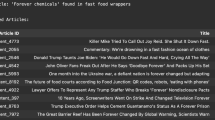Abstract
Identifying users’ interests to use in a recommender system is a difficult process because it needs a huge amount of data to analyze. On the other hand, each user has many historical data stored by the browser in his computer such as the visited pages including its title, visit date, URLs…etc. However, these data are not manipulated or analyzed properly to be used in recommender systems. In this research, we are proposing to use natural language processing techniques on the browser’s historical data, which collected from user’s actions on the browser to improve the recommendation systems in a way that helps to recommend and select news from recent news site based on the user’s interests and history. We experimented with our technique by developing an application that extracts and analyzes the historical data from the browser’s history. In addition, use the previously analyzed data in a recommender system. The experiments showed good results as discussed in the implementation part of this paper. The use of the browser’s history in recommender systems will enhance the recommendation process. This data can be used in the recommendation of news and other domains such as the advertisements, research topics, etc.
Access this chapter
Tax calculation will be finalised at checkout
Purchases are for personal use only
Similar content being viewed by others
References
Aggarwal, C.C.: Recommender Systems: The Textbook. Springer, Cham (2018). https://doi.org/10.1007/978-3-319-29659-3
Schaffer, J., Hollerer, T., O’Donovan, J.: Hypothetical recommendation: a study of interactive profile manipulation behavior for recommender systems. In: Proceedings of the Twenty-Eighth International Florida Artificial Intelligence Research Society Conference, pp. 507–512 (2015)
Ricci, F., Rokach, L., Shapira, B.: Recommender Systems Handbook. Springer, Boston (2015). https://doi.org/10.1007/978-0-387-85820-3_1
Khusro, S., Ali, Z., Ullah, I.: Recommender Systems: Issues, Challenges, and Research Opportunities. Lecture Notes in Electrical Engineering Information Science and Applications (ICISA) 2016, pp. 1179–189 (2016). Springer, Singapore. https://doi.org/10.1007/978-981-10-0557-2_112
Beel, J., Gipp, B., Langer, S., Breitinger, C.: Research-paper recommender systems: a literature survey. Int. J. Digit. Libr. 17(4), 305–338 (2016). https://doi.org/10.1007/s00799-015-0156-0
Adomavicius, G., Tuzhilin, A.: Toward the next generation of recommender systems: a survey of the state-of-the-art and possible extensions. IEEE Trans. Knowl. Data Eng. 17(6), 734–749 (2005). https://doi.org/10.1109/tkde.2005.99
Kandala, H., Tripathy, B.K., Manoj Kumar, K.: A framework to collect and visualize user’s browser history for better user experience and personalized recommendations. In: Satapathy, S.C., Joshi, A. (eds.) ICTIS 2017. SIST, vol. 83, pp. 218–224. Springer, Cham (2018). https://doi.org/10.1007/978-3-319-63673-3_26
Lu, H., Luo, Q., Shun, Y.K.: Extending a web browser with client-side mining. In: Zhou, X., Orlowska, M.E., Zhang, Y. (eds.) APWeb 2003. LNCS, vol. 2642, pp. 166–177. Springer, Heidelberg (2003). https://doi.org/10.1007/3-540-36901-5_18
Shaban, K.B., Chan, J., Szeto, R.: Interest-determining web browser. In: Perner, P. (ed.) ICDM 2010. LNCS (LNAI), vol. 6171, pp. 518–528. Springer, Heidelberg (2010). https://doi.org/10.1007/978-3-642-14400-4_40
Sulaiman, S., Abdul Wahid, R., Sarkawi, S., Omar, N.: Using stanford NER and Illinois NER to detect malay named entity recognition. Int. J. Comput. Theory Eng. 9(2), 147–50 (2017). https://doi.org/10.7763/ijcte.2017.v9.1128
Parvez, S.: Named entity recognition from bengali newspaper data. Int. J. Nat. Lang. Comput. 6(3), 47–56 (2017). https://doi.org/10.5121/ijnlc.2017.6304
Finkel, J.R., Grenager, T., Manning, C.D.: Incorporating non-local information into information extraction systems by gibbs sampling. In: Proceedings of the 43rd Annual Meeting on Association for Computational Linguistics - ACL 2005 (2005). https://doi.org/10.3115/1219840.1219885
Toutanova, K., Christopher D.: Manning. enriching the knowledge sources used in a maximum entropy part-of-speech tagger. In: Proceedings of the 2000 Joint SIGDAT Conference on Empirical Methods in Natural Language Processing and Very Large Corpora Held in Conjunction with the 38th Annual Meeting of the Association for Computational Linguistics (2000). https://doi.org/10.3115/1117794.1117802
Toutanova, K., Klein, D., Manning, C.D., Singer, Y.: Feature-rich part-of-speech tagging with a cyclic dependency network. In: Proceedings of the 2003 Conference of the North American Chapter of the Association for Computational Linguistics on Human Language Technology - NAACL 2003 (2003). https://doi.org/10.3115/1073445.1073478
Miller, G.A.: WordNet: a lexical database for English. Commun. ACM 38(11), 39–41 (1995)
Acknowledgments
We would like to thank Stanford NLP Group for all efforts of implementing the Stanford Named Entity Recognizer (NER) tool and the Stanford Log-linear Part-Of-Speech Tagger. Also to Princeton University because they developed the WordNet tool which we used in our research.
Author information
Authors and Affiliations
Corresponding author
Editor information
Editors and Affiliations
Rights and permissions
Copyright information
© 2021 Springer Nature Switzerland AG
About this paper
Cite this paper
Sawalha, S., Awajan, A. (2021). Recent News Recommender Using Browser’s History. In: Arai, K., Kapoor, S., Bhatia, R. (eds) Intelligent Systems and Applications. IntelliSys 2020. Advances in Intelligent Systems and Computing, vol 1251. Springer, Cham. https://doi.org/10.1007/978-3-030-55187-2_22
Download citation
DOI: https://doi.org/10.1007/978-3-030-55187-2_22
Published:
Publisher Name: Springer, Cham
Print ISBN: 978-3-030-55186-5
Online ISBN: 978-3-030-55187-2
eBook Packages: Intelligent Technologies and RoboticsIntelligent Technologies and Robotics (R0)




